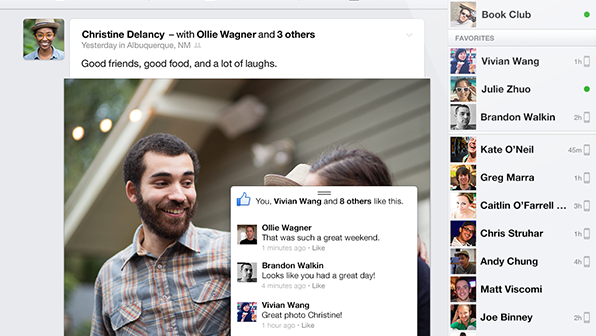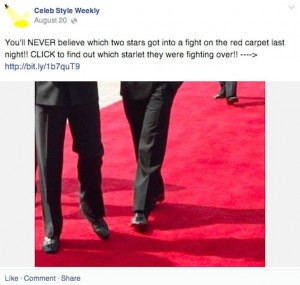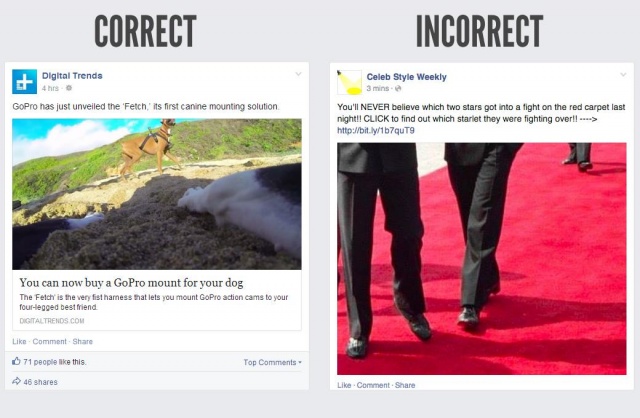Click-baits are those spammed headlines on Facebook (NASDAQ:FB) which suddenly appear in user’s newsfeed on home page. A user, who scrolls down his newsfeed often sees a prominent headline that talks about some spicy issues or other information related to it; such information is bound to capture the user’s attention. The headline is posted to convince the user to read rest of the story but upon clicking nothing useful of interesting shows up. Facebook (NASDAQ:FB) plans on getting rid of such news and headlines that lead to nothing exciting. According to the Facebook (NASDAQ:FB) authorities, users do not want to read such irrelevant and clichéd stories, they want to read something informative yet interesting. The headline makes a user decide whether he is going to read the article or not.
Facebook (NASDAQ:FB) is now devising a new strategy for tracking people who click and read online articles that are not on Facebook or the ones they read before signing into their accounts. In addition to this Facebook (NASDAQ:FB) also plans to find out how long after reading those articles they sign in their Facebook accounts. If they do it at once then it suggests that the article was not interesting enough to retain the user’s attention.
The new strategy will make use of those stories in clickbaits which get a lot of clicks but fail to engage the readers. Facebook (NASDAQ:FB)is also going to consider the amount of discussion a particular story or content is generating. Another factor which is important to detect the readability and popularity of content is through its likes and comments. A content which has higher clicks but less likes and comments is considered to be less informative. While talking about the upcoming changes to Facebook (NASDAQ:FB), authorities said that the click-bait headlines will now be taken out from users’ favorite pages in order to keep them updated and entertained.
Moreover, the company has plans to modify the links display method. Links are commonly shared in two ways; either users get a complete link with a large image and a description of the main idea or links embedded in status updates or captions of the photos. Facebook (NASDAQ:FB)has confirmed that the former method of sharing a link is more productive than the later and it can easily be used in a mobile device. The proper link format is said to get double clicks and traffic as compared to the other methods. Hence, Facebook (NASDAQ:FB)will now show fewer links posted in captions or status updates.
These changes however are small and mostly users and publishers will not be able to take notice of such minor changes. The company said that these changes are essential for the visibility of content that is productive and in demand by the users.
Facebook (NASDAQ:FB)also cleaned up the practice of like-baiting earlier this year. Like-baiting is a very popular practice on Facebook (NASDAQ:FB) which allows self marketing; people ask other users to like their status updates or pages in order to increase their ranking. Facebook (NASDAQ:FB)took a strict action against this practice and they made it very clear that such users are not going to be rewarded anymore.







Pingback: ไฮโลออนไลน์
Pingback: danmark apotek
Pingback: บ้านมือสอง
Pingback: 다시보기
Pingback: click resources
Pingback: สติ๊กเกอร์บาร์โค้ด
Pingback: โปรแกรมจัดการบริหารหอพัก
Pingback: white berry strain for sale near me
Pingback: https://www.jcp.or.jp/pc/r.php?https://devs.ng/huddersfield-vs-nottingham-forest-prediction-betting-tips-25-09-2020/
Pingback: FAFA789 เว็บตรง
Pingback: พรมรถยนต์ gwm
Pingback: ข้อดีในการแทง หวยหุ้น หวยหุ้นนิเคอิ
Pingback: outdoor furniture bangkok
Pingback: noonoo.org
Pingback: tải go88
Pingback: som777
Pingback: Bilad Alrafidain
Pingback: ทำความรู้จักกับ Kingmaker ค่ายเกมอันดับ 1
Pingback: Diyala Univer
Pingback: เช่ารถตู้พร้อมคนขับ
Pingback: พอต ราคาถูก
Pingback: ประวัติของค่ายเกมคาสิโน sa บาคาร่า
Pingback: lazywin888
Pingback: Jaxx Liberty
Pingback: rechargeable disposable vape
Pingback: no789fun
Pingback: ทดลองเล่นสล็อต PG SLOT
Pingback: THWIN9 เว็บสล็อตใหม่ล่าสุด
Pingback: คลินิกความงาม ช่องนนทรี
Pingback: sugar rush
Pingback: สั่งซื้อ หวยออนไลน์ กับ LSM99play
Pingback: บริการของ Money911
Pingback: ฆอ
Pingback: situs toto
Pingback: i recommend this drugstore in denver
Pingback: vegus666
Pingback: sweet bonanza oynamak
Pingback: brians club
Pingback: แทงหวย24
Pingback: 電子煙
Pingback: หนังโป๊ซับไทย
Pingback: visit site
Pingback: how much does a cord of wood cost
Pingback: ระบบเทรด ea forex
Pingback: endoliftX ที่ไหนดี
Pingback: 思博瑞
Pingback: click here to investigate
Pingback: ดีลโรงงานจีน